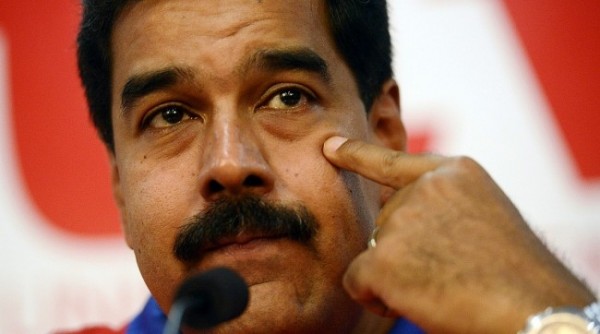 Opposition leaders in Venezuela said Friday they have finished the process of authenticating signatures on a petition to recall President Nicolas Maduro, and have enough to hold a referendum on removing him.
Opposition leaders in Venezuela said Friday they have finished the process of authenticating signatures on a petition to recall President Nicolas Maduro, and have enough to hold a referendum on removing him.
“The number of signatures has clearly exceeded the minimum needed,” said Vicente Bello, coordinator for the referendum effort.
Government election authorities now have 20 days to review and affirm that finding.
Opponents of the regime finished giving their fingerprints to electoral authorities earlier Friday, wrapping up a key stage in their drive for a referendum to remove Maduro.
Already used to queuing for hours to buy food in an economic crisis, this week they lined up at electoral offices for a sometime frustrating process.
Officials took their electronic fingerprints to authenticate signatures on a petition calling for a recall referendum. That is just one stage in a months-long bureaucratic procedure.
One voter in the northern city of Maracay, civil servant Felix Rodriguez, skipped work to come and give his signature.
He has no flour, milk or meat in his kitchen. His old truck is broken down and there are no spare parts available.
“Prices are going up every day, on top of the shortages,” he said. “Whether you have money or not, you’ve got problems.”
In Maracay the electoral office opened late, due to electricity cuts.
The queue stretched for several blocks in the 30-degree Celsius (86-degree Fahrenheit) heat. Rodriguez had to rush back to the office.
“I took a risk by leaving work,” he explained. In the end, he said angrily, “I won’t be able to validate my signature.”
1.3 million signatures
Friday was the fifth and last day of the fingerprinting process, which could make or break the bid to hold a recall vote on Maduro.
The opposition MUD coalition has accused the government of sabotaging the process through delays, obstacles and veiled threats to suspend the process.
Of the 1.3 million signatures recorded by the electoral board in the initial petition, at least 200,000 must be authenticated to pass to the next phase, with a minimum amount required in every state.
Opposition lawmaker Delsa Solorzano said 326,000 fingerprints have already been submitted overall. These have yet to be validated by the National Electoral Council (CNE).
It said it will do so by July 26.
The next step will require the collection of four million more signatures to call a full referendum.
The opposition is rushing to complete the recall process by January 10, the cutoff date to trigger new elections.
After that date, a successful recall vote would simply pass power to Maduro’s hand-picked vice president.
Maduro vowed there will be no referendum this year.
“If there is one, we will go and win it. If there isn’t, political life in this country will go on,” he said.
And on Friday, during a military ceremony in Caracas, Maduro railed against those favoring the referendum—particularly Luis Almagro, secretary general of the Organization of American States.
The beleaguered Maduro blasted “the vulgar, illegal and immoral interventionism” that he claimed was being carried out against the South American country, after Almagro this week presided over meetings about the crisis in Venezuela and voiced support for efforts to remove him.
‘Economic war’
Venezuela is grappling with an economic crisis sparked by the plunge in prices for its crucial oil exports.
People face shortages of basic foods and goods as well as electricity blackouts.
Deadly looting erupted last week. Authorities said at least five people were killed and more than 400 arrested.
The opposition says Maduro’s economic management is to blame. They denounce the jailing of his political opponents.
Senior opposition leader Henrique Capriles was on the northern island of Margarita, where final decisive results of the fingerprint count were being keenly awaited Friday.
“With this great conclusion we will teach them a lesson,” he said of the government.
Maduro blames the crisis on an “economic war” by his capitalist rivals.
He has alleged irregularities in the signature process and challenged the referendum bid in the courts.
Waiting in line at a supermarket in Caracas, Ramon Bernay, a retired economist of 64, said he stood by Maduro in spite of the country’s problems.
“I wait in line every day and the situation is annoying,” he said.
“But I hold out, because the cause of it is an economic war by the bourgeoisie.”
FRANCE24/(AFP)

Leave a Reply
You must be logged in to post a comment.